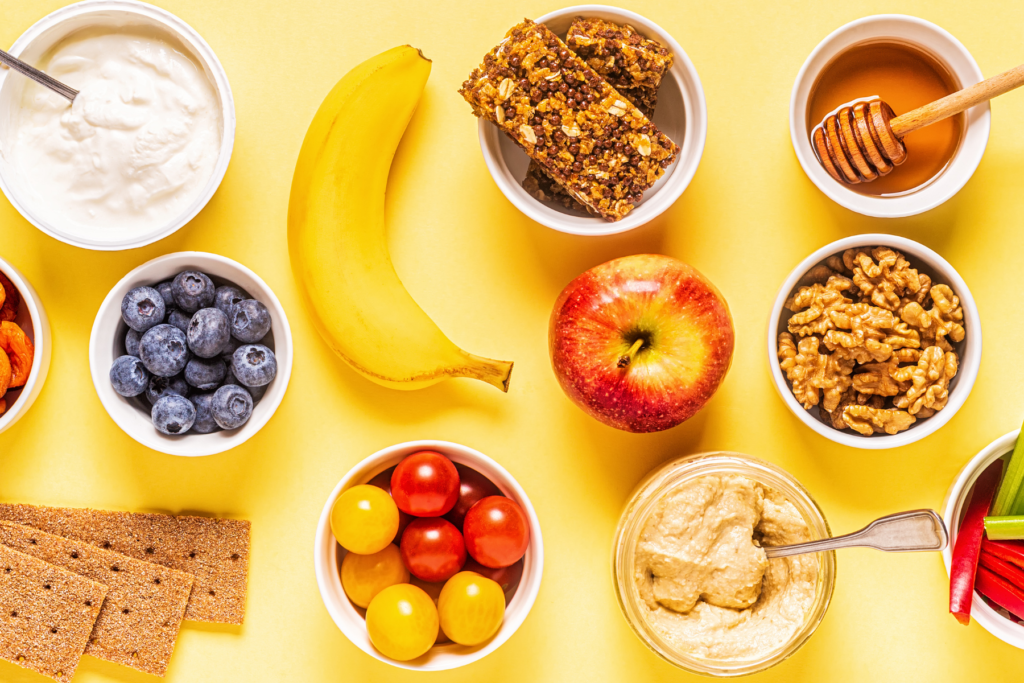Active Women and Intuitive Eating
January 31, 2022

Intuitive eating can have a place in an active lifestyle.
It can seem counterintuitive to set aside the calorie counting apps and fitness trackers when looking to achieve our goals in the gym. However, meticulous tracking and calculating is not necessary in the world of health and fitness. In fact, simply listening to your body, especially if you have been ignoring it, can help you make huge strides towards your health goals.
Why Tracking Doesn’t Work
Every single day of our lives is different. Some days we spend time walking around the grocery store and walking at the park. Other days, we spend time sitting at a desk and watching Netflix at the end of the day. As active women, our workouts can vary greatly in intensity and duration day-to-day too.
Thus, it’s safe to say that our daily caloric needs change on a daily basis. Not to mention the many other factors that impact our energy needs like stress, sleep, weather, hormones, and more.
Because our needs fluctuate every day, trying to hit a certain calorie goal set by MyFitnessPal is not realistic. Focusing on staying within a rigid calorie range can cause an unnecessary focus on food. There is no need to have to constantly worry about making food choices that will “fit” into your allotted calories for the day.
Having a calorie goal can potentially lead to under-eating and under-fueling as well. Ignoring your hunger to stay within your calorie goal can impact your energy, performance and recovery. Not to mention, that the calculated amount of calories in food is not always that accurate.
Underfueling an Active Lifestyle
For men and women, not eating enough can be harmful to health. Under-fueling can lead to poor sleep, a lack of focus, a weakened immune system, and an intense fixation on food.
For active individuals, not eating enough can greatly impact athletic performance and recovery. Further, underfueling can result in more frequent injuries that take longer to heal.
For active women in particular, the female athlete triad is a common consequence of undereating. This condition involves three components: undereating, amenorrhea (or loss of period), and a loss of bone density.
When the body doesn’t get enough calories, it shuts down functions that are not essential to life like the reproductive system. Hormones produced throughout the menstrual cycle like estrogen play a role in maintaining bone health. With prolonged amenorrhea, bones can become less dense, increasing the risk of osteoporosis.
The female athlete triad can have long lasting impacts on health. Bone density is no longer built after we reach our mid-twenties. Further, having no period for a prolonged amount of time can impact hormone balance and fertility.

Listening to Your Body
Our bodies are smart. Much smarter than MyFitnessPal.
Intuitive eating requires listening to our bodies. Allow yourself to eat when you are hungry. Tune into your cravings and enjoy the foods that your body asks for.
Although it can seem daunting at first, practice makes perfect. It is important to quit the “good’ food “bad” food mentality and to be intentional when eating. When we stop labeling food, “bad” foods lose their novelty and we start to see all foods as equally worthy options. Over time, it becomes easier to choose the foods our body wants in the moment rather than stressing over making the “healthy choice”.
Planning Ahead with an Active Lifestyle
For active individuals, intuitive eating may not seem all that intuitive. In order to make sure that you are meeting your higher energy needs as an active person, planning is essential.
Trying to eat every 3-4 hours can prevent you from feeling ravenous once meal time rolls around. This can allow you to have comfortably sized meals and to better focus on fullness and hunger cues at meal times.
Planning for pre and post-workout snacks is another important part of fueling an active lifestyle. Pre-workout snacks can provide the fuel for a great workout while post-workout snacks can help support recovery and injury prevention. Check out our other posts for more on what to eat pre and post-workout!
For active individuals, it can still be important to consider eating enough protein and carbohydrates. Intuitive eating may look like planning to have a source of protein and carbohydrate at each meal. It may also mean eating when not hungry to make sure that you are meeting your increased energy demands.

Key Takeaways
Although it can take some planning, intuitive eating can and SHOULD have a place in an active lifestyle. Active men and women simply need to be more intentional with their nutrition by creating a strong foundation in their daily routine. With a strong foundation, intuitive eating gets easier and listening to your intuitive cues beyond that strong foundation can make a huge difference in uncomplicating nutrition and your relationship with food.
If you are looking for support in starting your intuitive eating journey, we have two great resources for you:
My masterclass on Fit Fueling & Intuitive Eating for Active Women is available for purchase for only $39 here. This 60 minute intensive will teach you to…
- Confidently fuel your active lifestyle w/o constant food thoughts or mysterious health issues.
- Feel empowered about your food choices.
- Understand why intuitive eating needs to look different for active women
Looking for 1:1 guidance? Check out our Fueled.Fit.Balanced program for active women (and men too)! This program was built to give you the individual guidance you need to seamlessly apply intuitive eating to your active lifestyle and get rid of food confusion and overwhelm for good. You can learn more here.
[…] get intuitive about your choices. Now that you’ve identified what you already have, ask yourself what you’re […]
[…] no longer are forced to do what your team, trainers, or coaches are requiring you to do. Just like intuitive eating, intuitive fitness is all about listening to your body and what best serves it in the […]